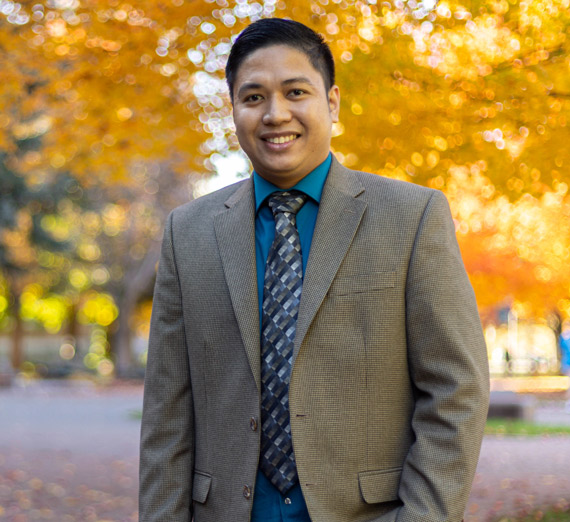Filipino Fulbright Scholar Finds Home Away from Home at Gonzaga

Jareason Fabre spent his 30th birthday in August on a flight – a really long flight – taking him away from his native Philippines for the first time. And, more importantly, away from his wife and 5-year-old son for the year he’s spending as a Fulbright Foreign Language Teaching Assistant at Gonzaga.
Don’t expect to hear any regrets from Fabre three months into his Spokane adventure, though. While he admits to some homesickness, the language scholar is effusive in relaying his experiences so far. Besides, he was intentional in finding a place to teach and study where he didn’t know a soul.
“I wanted to go to a place where I don’t know anyone and be a complete stranger on purpose,” Fabre says in his College Hall office dotted with Filipino cultural artifacts. “I think that’s the fun of traveling outside your country.”
I looked up Spokane, and the pictures looked unrealistic to me until I came here. It’s much more beautiful to see it personally. The place is so lovely.
Fabre is teaching Tagalog language courses and doing cultural outreach with Gonzaga’s string of Filipino visiting scholars, which is a big reason Fabre applied to work here. Back home, he teaches English and education, and is pursuing his Ph.D. in linguistics.
“I’d heard a lot of good news about Spokane,” Fabre says. “I’d heard it’s close to nature, simpler, but a good-sized city. I also wanted snow. The Philippines, it’s tropical, it’s always warm and humid. I looked up Spokane, and the pictures looked unrealistic to me until I came here. It’s much more beautiful to see it personally. The place is so lovely.”
The natural beauty is important to Fabre for more than just aesthetic pleasures. When he’s feeling homesick, he tries to connect with nature by going to the Spokane River and watching it flow. He’ll send messages to his family, or write diary entries “to remember this experience.”
“Nature here in Spokane just gives you unlimited choices of things to wonder at and to praise God, because it’s such a beautiful place, and has such beautiful people,” Fabre says. “I always try to give myself time to cycle around by the river and the trail going to Riverfront [Park]. Sometimes I’ll just sit down there and relax and meditate and appreciate how different Spokane is, and how people of diversity could live harmoniously with each other.”
What I’m going to learn from here is something I think will be useful and improve myself professionally.
Fabre admires how welcoming both the Gonzaga and greater Spokane community have been. Even though it’s a predominantly white community, he says he’s never felt out of place.
He describes GU as “a heaven for academic freedom,” and he’s thrilled he’s been allowed more responsibilities than his fellow Fulbright assistants, thanks to the University treating him as a primary teacher and visiting faculty. He gets to design his own course, teach at his own pace.
“We have supportive supervisors in Christina Isabelli and Ben Semple, we have good facilities, just an ideal classroom environment,” Fabre enthuses.
The learning in Fabre’s Tagalog classes isn’t confined to the classroom, though. The eight students he has are all of Filipino heritage, and he makes sure they meet up with Filipino community members off campus for potlucks of traditional Filipino dishes and to learn the social mores of Filipino culture. Karaoke and group singalongs help the students learn Tagalog differently than reciting phrases from a book. Fabre also helps organize online conversations with Filipino scholars across the U.S., giving students access to a wide range of expertise.
Fabre will spend Christmas break with relatives in California, and while the Philippines shares many of the same holiday traditions common in the U.S., he’s teaching his students some of the country’s pre-colonial celebrations tied to the harvest season in the Philippines. He’ll also emphasize how much the country’s natives value family during these times.
“I’m the only Fulbright scholar who is married and has kids, and I can’t bring them here ,” Fabre says. “But I’m trying to look on the bright side. What I’m going to learn from here is something I think will be useful and improve myself professionally. And personally, now I get to value more about my family now that I’ve learned how difficult it is to be away from them. After seeing what the USA is, I’m looking forward to bringing them here in the future.”
